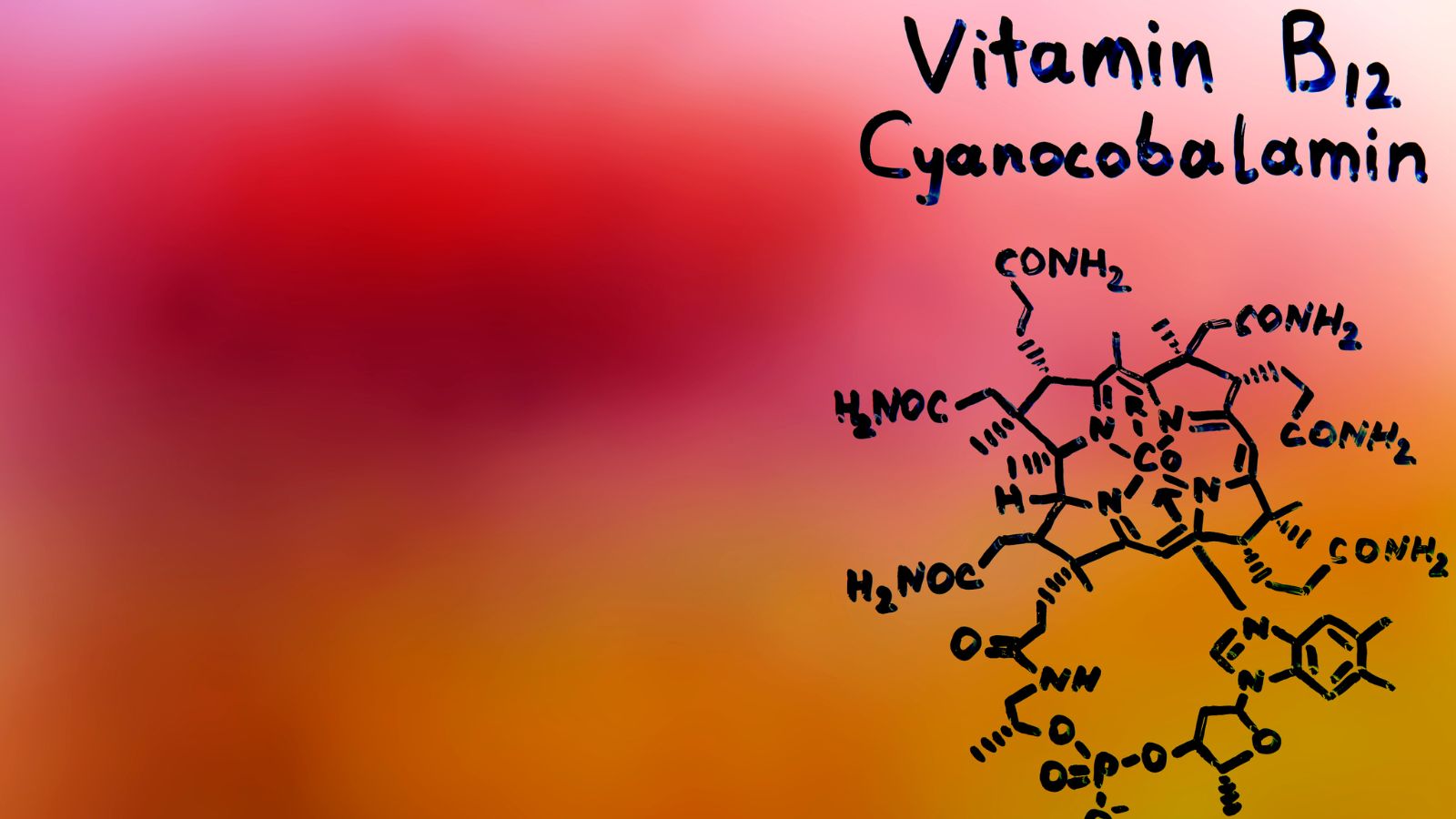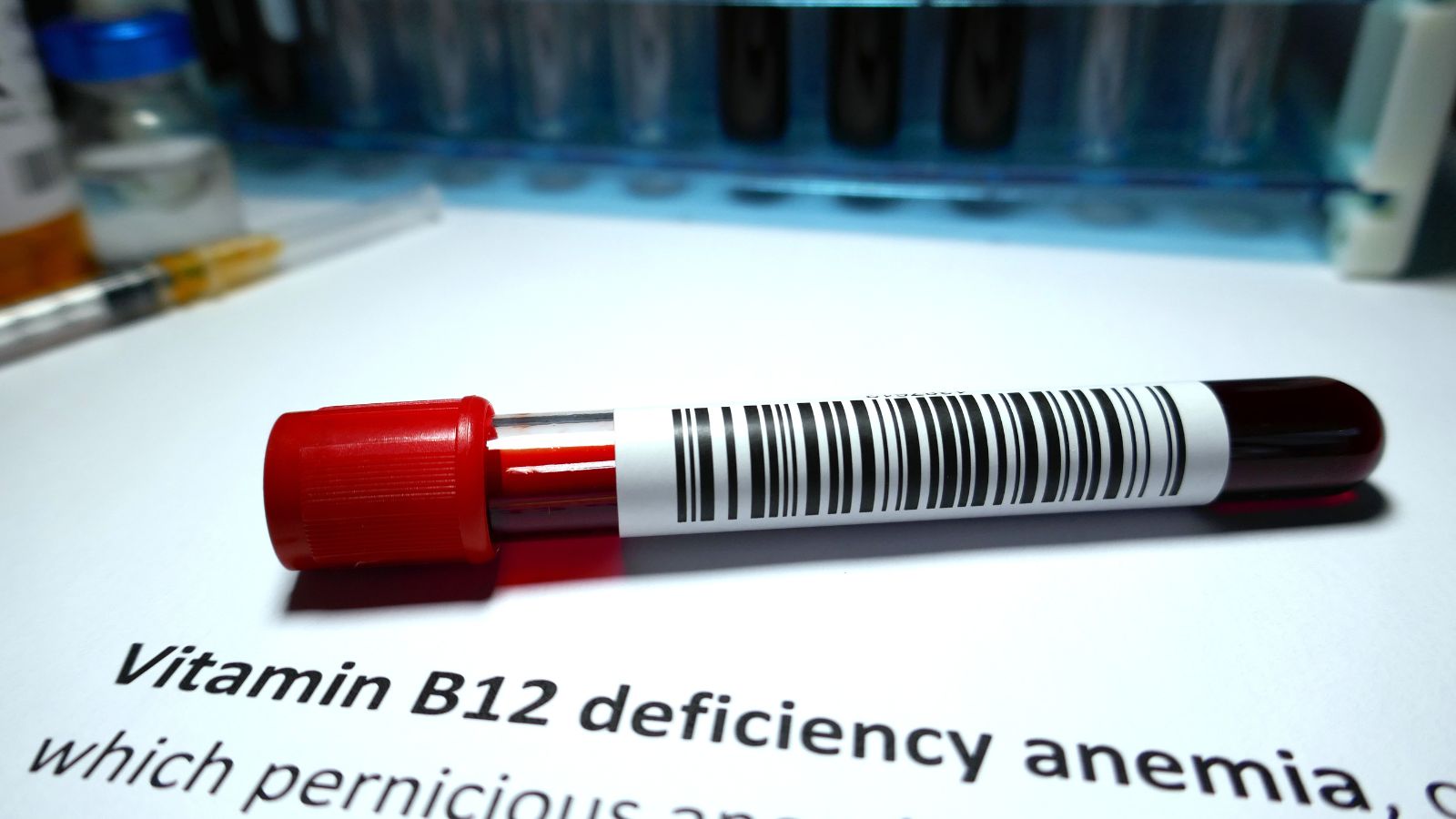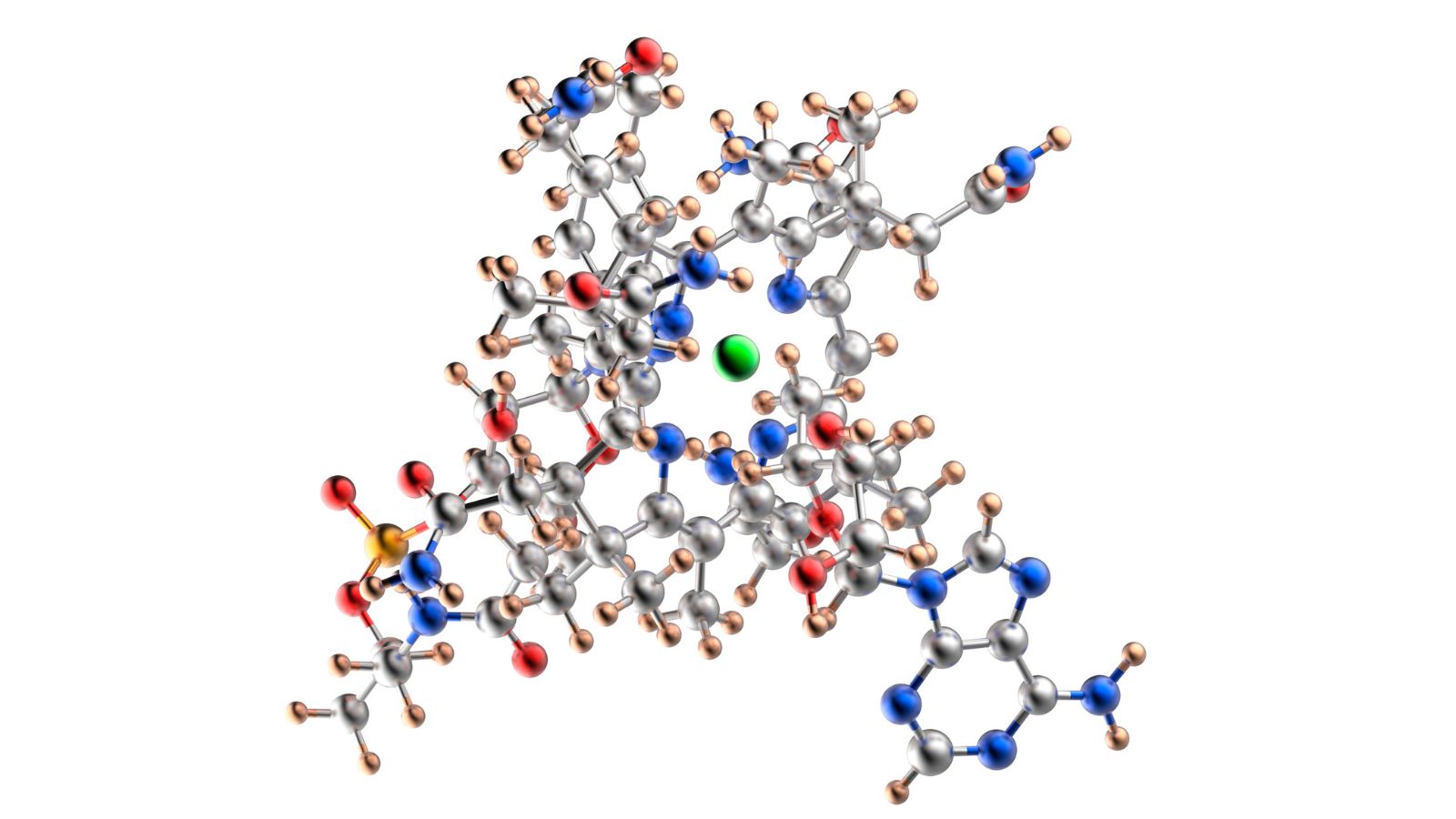What is Vitamin B12 and why is it important?
Vitamin B12, also known as cyanocobalamin, is an essential vitamin that plays a crucial role in the body. It’s widely found in animal-derived foods such as fish, dairy products and egg yolks. Vitamin B12 is an essential water-soluble vitamin required for proper red blood cell formation, neurological function, and DNA synthesis (1). The body needs it to make red blood cells and DNA, support a healthy brain and nervous system and aid with energy production. Many people are aware of its importance but may not be aware that it is also stored in your liver. The liver is an important organ for storing various nutrients including all of the fat soluble vitamins (A,D,E and K). When we consume foods containing vitamin B12, our bodies absorb it from the intestines before sending it to the liver where it is stored until needed by other parts of the body. Vitamin B12 deficiency can lead to anemia, fatigue, nervous system malfunction, and neurological damage (2).
The amount of vitamin B12 stored varies from person to person based on dietary intake and metabolism rate. The recommended dietary allowance (RDA) for adults over 19 years old is 2.4 micrograms per day. The recommended daily dose should be consumed regularly to ensure optimal storage levels are maintained in the liver over time because insufficient stores can lead to health problems such as anemia or nerve damage. Since the primary source of vitamin B12 is animal-based foods such as meat, poultry, fish, dairy products and eggs, vegetarians and vegans may need to supplement their diet with vitamin B12 as they are unable to obtain it from dietary sources. Vitamin B12 can also be found in fortified breakfast cereals and other fortified foods, so it’s important to check the nutrition label on food packaging for the presence of this nutrient. Vitamin B12 interacts with folate to facilitate the production of red blood cells in the body (3). Also, B12 is necessary for the metabolism of fat and carbohydrates from food into energy (4).

Vitamin B12 deficiency:
If you’re low on B12 or have a deficiency, you may experience fatigue, numbness or tingling sensations in the hands or feet (neuropathy), weakness, poor concentration and memory problems. If you experience these symptoms it is important to get a blood test to see if your levels are low. If you find that you have low levels of vitamin B12 or you’re at risk of deficiency then there are many ways to boost your intake – from oral supplements and injections to ‘energy shots’ – but make sure you speak with your doctor first before trying any new supplement or treatment. A lack of B12 can cause serious health issues over time so it’s important to keep your levels topped up if needed.

So what are some of the ways you can get more B12?
Well, firstly, there are oral supplements; most multivitamins contain some vitamin B12. If you’re not getting enough from your diet then you may need to consider taking additional supplements daily – this is especially true for those who follow vegan diets since most plant-based sources don’t contain enough vitamin B 12 for optimal health benefits.
Injections and IV (intravenous) infusions are another way to boost your levels quickly, but they’re not necessary for everyone, especially if they get enough B12 from their diet. Injections are often used to treat severe deficiencies, although they can also be used by some athletes (recreational and professional) and bodybuilders that want to boost their energy levels or improve muscle growth.
However, there are some potential side effects of B12 injections that should be considered before making the decision to use them.

Side effects and reactions to B12 injections:
One of the most common side effects is a skin rash or itching at the injection site. This typically isn’t severe and usually goes away within a few days, but it can definitely be uncomfortable while it lasts. Other less common reactions include an upset stomach or nausea, dizziness, headaches and difficulty sleeping. People with certain allergies may also experience more serious reactions such as hives or swelling of the face/throat area.
Who should consider a B12 injection and who should seek other alternatives?
Indications for B12 injections can include a vitamin B12 deficiency, pernicious anemia, neurological issues such as depression or memory loss, fatigue and poor concentration. Nerve cells rely on vitamin B12 to maintain their protective sheaths made of fatty substances called myelin (5). Vitamin B12 works in conjunction with other vitamins like vitamin D and iron to help prevent bone loss (6). Studies have shown that adequate levels of vitamin B12 are also important in preventing cognitive decline in elderly populations (7). Research has found that improved muscle growth and performance gains can be achieved from vitamin B12 supplementation. This is in part due to the athlete being able to maintain a higher level of training intensity and volume.
Contraindications include allergies to cobalt, or any other ingredients in the injection solution, any bleeding disorder such as hemophilia or leukemia, high blood pressure that hasn’t been treated with medication yet and renal failure. It’s also important to note that B12 injections can interact with certain medications, including methotrexate (a drug used for rheumatoid arthritis) and warfarin (a blood thinner). If you are taking any medication regularly or have any of the conditions listed then you should consult your healthcare provider before supplementing with vitamin B12 as there could be an increased risk for adverse reactions if taken together.
How much do Vitamin B12 injections cost and where can I get one?
Vitamin B12 injections can vary in price depending on where you live; in the UK, for example, a single injection typically costs between £15-20 while in the US the cost can range from $30-50. There are also ‘energy’ shots available at many pharmacies such as Superdrug which contain vitamin B12 alongside other ingredients such as caffeine and guarana – these are generally cheaper but not suitable for everyone so again make sure you check with your doctor first if considering this route.

What vitamins and minerals work with B12?
It’s important to remember that vitamin B12 doesn’t work alone; it acts synergistically with other vitamins and minerals such as folate (vitamin B9), iron, copper and zinc in order for your body to get the most from it.
How does folate, iron, copper and zinc work with vitamin B12?
Folate is important for maintaining healthy red blood cells and iron helps transport oxygen around the body. Low levels of both these nutrients can lead to anaemia which can cause fatigue, shortness of breath and pale skin. Deficiency in either iron or vitamin B12 can result in a decrease in white blood cells which are important for fighting infections (8). Copper helps store energy for later use; and zinc plays a role in cell metabolism. It’s also worth noting that iron, copper and zinc work together with vitamin B12 in order for it to be synthesized properly by your liver; this process is necessary for building up stores of the nutrient so that you don’t become deficient over time.
Vitamin B12 and the nervous system
Alongside providing the body with energy, vitamin B12 also helps to keep your nervous system healthy. It is necessary for the proper functioning of the nervous system and to keep the brain alert and focused (9). It’s important for the formation of myelin – a fatty substance that coats nerve cells and helps them to transmit signals quickly and efficiently. Low levels of B12 can lead to numbness or tingling in the hands and feet (neuropathy) as well as other neurological issues such as depression, memory loss or confusion. Together, these nutrients help provide the body with energy from various systems including ATP-PC (adenosine triphosphate phosphocreatine), anaerobic glycolysis and aerobic respiration. This means that when you’re engaging in physical exercise or even just doing activities of daily living such as walking around your house, your body is able to draw upon different sources of fuel efficiently – this is particularly beneficial for athletes who need to recover quickly between high-intensity training sessions or competitions. Additionally, having adequate levels of these essential vitamins and minerals can help you stay resilient during times of stress when your energy levels may be low. So make sure you’re getting enough of these other essential elements too for optimal health benefits!
In conclusion, vitamin B12 is an important nutrient that plays a crucial role in converting various compounds into other essential molecules needed for a healthy body (10). Careful monitoring of dietary intake should ensure optimal storage levels are maintained for optimal health benefits. If your levels are low or you’re at risk of deficiency then there are many ways to boost your intake – from oral supplements and injections to ‘energy shots’ – but make sure you speak with your doctor first before trying any new supplement or treatment.
If you have any questions about vitamin B12, or anything else covered in this article, please don’t hesitate to get in touch with us.
Keep your energy levels high and Recover Fast!
References:
1. Bailey, L. B., Daley, C., & Dangour, A. D. (2016). The role of vitamin B12 in neurological function and dementia. Nutrition Reviews, 74(2), 129–140. https://doi.org/10.1093/nutrit/nuw001
2. Bredella, M., Dorey, F., Torriani, M., Thomas, S., Schoenfeld DA., Majumdar S., Rosen CJ.(2012). Association Between Low Vitamin B12 Levels and Bone Mineral Density In Obese Young Women: A Cross-Sectional Study Radiology 265(3): 851
3. Deutsche Gesellschaft für Ernährung. (2018). Vitamin B12. Retrieved from https://www.dge.de/wissenschaft/referenzwerte/vitamin-b12/
4. Garcia-Ptacek, E., Pereda, N., Lleo, A., Blesa, R., Sarasa-Renedo, A., Costa, J., & Clarimón, J. (2014). Relationship between Vitamin B12 and Cognitive Performance in the Elderly: A Cross-Sectional Study Based on the POLA Study [Abstract]. Journal of Alzheimer’s Disease, 41(1), 1–8. doi: 10.3233/JAD-132084
5. Dianzani C et al (2017) Vitamin B12 Deficiency: Causes and Clinical Significance. Int J Vitam Nutr Res 87(3):163–174
6. Hendler SS & Rorvik DR (2008). PDR for Nutritional Supplements 2nd edn. Thomson Reuters; Montvale: NJ
7. Rath, S., & Kannan, S. (2019). Role of Folate and Vitamin B12 in Red Blood Cell Formation. Nutrients, 11(7), 1545. https://doi.org/10.3390/nu11071545
8. Deutsche Gesellschaft für Ernährung. (2018). Vitamin B12. Retrieved from https://www.dge.de/wissenschaft/referenzwerte/vitamin-b12/
9. Bailey, L. B., Daley, C., & Dangour, A. D. (2016). The role of vitamin B12 in neurological function and dementia. Nutrition Reviews, 74(2), 129–140. https://doi.org/10.1093/nutrit/nuw001
10. Hendler SS & Rorvik DR (2008). PDR for Nutritional Supplements 2nd edn. Thomson Reuters; Montvale: NJ





